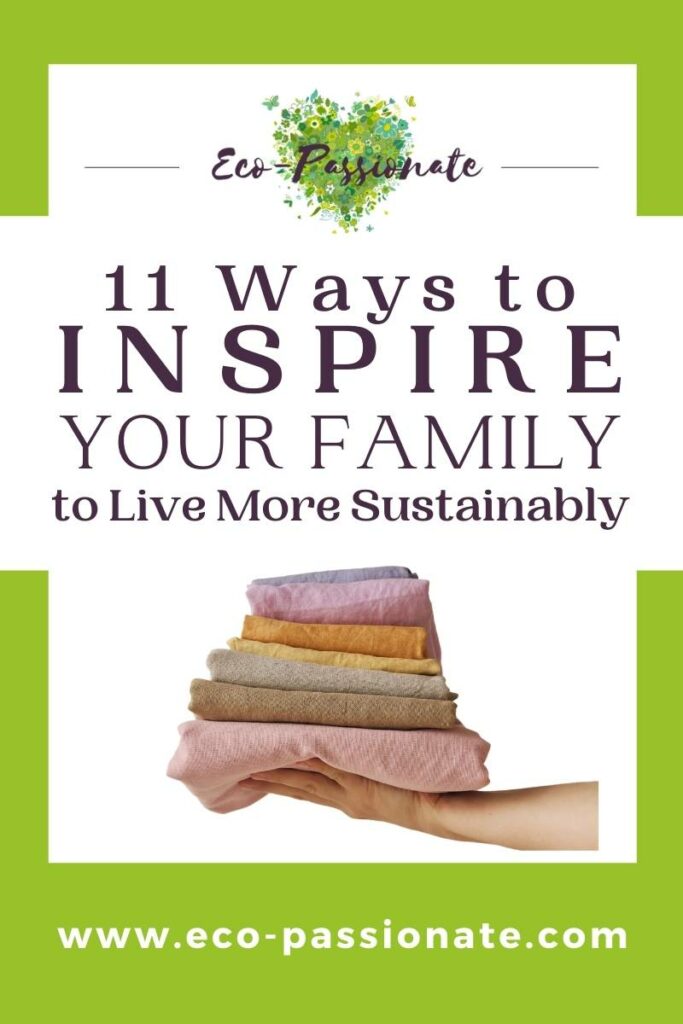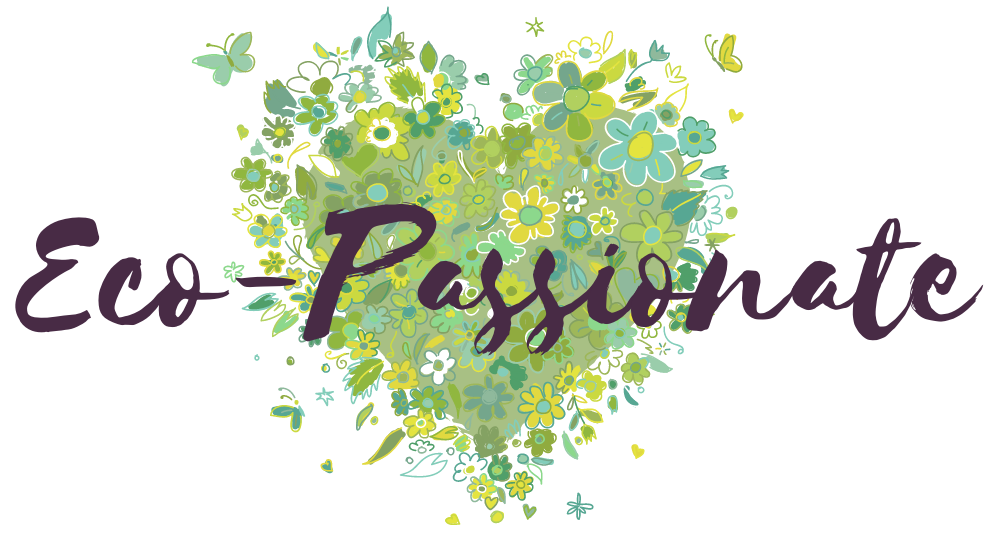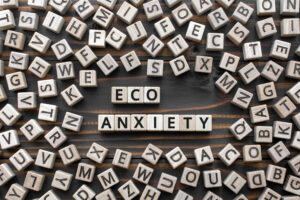11 Ways To Inspire People to Live More Sustainably [Insights]
What stops people from living more sustainably? Compared to 30 years ago, many more people are trying to live eco-friendlier lives, and it’s hardly necessary anymore to explain the reasons why we all should. Yet, most people agree that they could be doing more. So, what stops them? I’ve been exploring this question for most of my life. The answers I’ve found might surprise you.
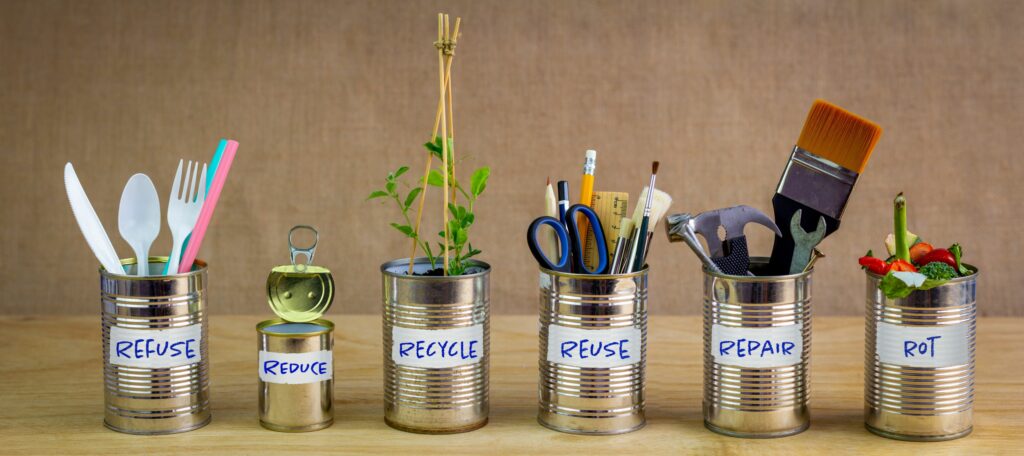
How Can We Inspire People to Live Less Un- Sustainably?
Have you been spending lots of time and energy struggling to convince certain people to stop being so wasteful or living so unethically? Do you explain the reasons until you’re blue in the face and getting nowhere? Wanna find out how to inspire people to live more sustainably without blowing up your brain? Let me just take you on a brief snap-shot tour of my early days in environmental education to show you why I do things a little bit differently and then we’ll go on with the tips and tricks. (Or you can just scroll down til you get to them–it’s up to you!)
What doesn’t work:
It should come as no surprise that just telling people what to do or not do, almost never works. With few exceptions, people just don’t want to be bossed around (unless you’re paying them, of course). Ever notice how effective guilt-tripping is when it comes to getting people to change their ways? Didn’t think so. How about shaming and blaming as a tactic? Yeah, right. That’s a great way to alienate people you’re close to and get them to become even more resistant. On the other hand, people do appreciate good advice, when they seek it, and can get it. Not so much when they haven’t asked for it.
They’re waiting for you
Don’t lose heart! There are in fact people out there who want you to know how to inspire them to live more sustainably! Because they need more inspiration! It just takes quite a bit of finessing.
To explain how nuanced inspiring eco-friendly behavior can be, I’d like to paint a picture of how I learned a thing or two…
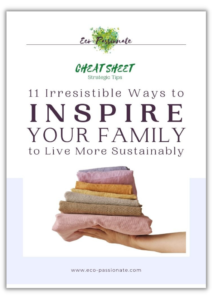
Get the FREE Cheat Sheet with the complete list of strategic tips in compact form!
Click the button below to opt-in
What really stops people from living more sustainably?
Believe it ot not, it’s not about money. It’s not so much about ego either. It’s not even about awareness. If you’re guessing that there is an element of fear and denial involved, you’d be right–you can read more about that in my post on eco-anxiety. But, no, I would argue that, on the whole, more than anything, it’s about habits.
How can habits stop people?
What makes it so hard to change habits is the fact that, at its root, our resistance to changing habits is a survival instinct. Choosing and adopting a certain new lifestyle of any kind takes time and costs us lots of mental energy. Forming habits saves us time and conserves our mental energy. Below is a quote that sums it up nicely. More resources are given at the end of this article.
“Once our habits are learned, repeated and acquired, they start to occur automatically. Tasks such as brushing our teeth, [washing up dishes, swimming, riding a bike] or driving a car, which we learned initially through a series of steps that required significant concentration and time, are now performed with barely any thought. [Habits] allow us to perform many actions in daily life, often simultaneously while doing other things without having to stop and fully concentrate on what we are doing, thus saving us time and energy.” – Cecelia Health
Changing habits is personal
After all, how should anyone else know what’s best for me, whether we’re talking career or lifestlye? They are not me! Everyone has an opinion. No one has the right to dictate my lifestyle or tell me how to live. Nor do I have any right to do this to anyone else.
For me, the best career path has been environmental education. You know what they say about hindsight. It actually took me thirty years to see and fully appreciate that. I had to find it out “the hard way.” I’ve been given plenty of unsolicited advice in my life. As you can probably imagine, I resist doing what I’m told as much as any other rebel. And that’s the reason I understand change-resistant people so well. Know what I mean?
Breaking a habit is usually the lesser of two evils.
Addiction, as defined by the American Society of Addiction Medicine, is an inability to stop engaging in a behavior or using a substance even though it is causing harm. So, when do habits become harmful?
Take Coffee, For Example
Drinking coffee is known to be an addictive habit, but is it harmful?
From age 22 to 32, I was a coffee freak, who was nonetheless highly motivated to live sustainably. Nothing but shade-grown, fair-trade, organic espresso roast, double-shot with steamed milk plus half an inch of foam, thank you very much! Until my life quota on caffeine was abruptly reached, that is.
Before that, I was a hopeless addict. I’d rather have been late for work than miss my morning ritual. Worse still, I was incapable of passing a café without grabbing a refill. And then, BAM! Literally overnight, I became caffeine intolerant. Despite my withdrawal symptoms, caffeine was suddenly and unexpectedly no longer enjoyable to me, not in any form. My nerves would go haywire after just a sip, and the feeling was far from pleasant. I have been unable to drink ‘real’ coffee since 2003. End of coffee habit.
If it hadn’t been for my genetically inherited caffeine intolerance, I’m sure I would still be spending a fortune on beans and barista paraphernalia.
Since I subconsciously associate caffeinated drinks (not just coffee, also black and green teas) with an unpleasant experience, it didn’t take long at all before I stopped thinking about coffee and other caffeinated drinks altogther. And, no, I don’t miss them one bit.
Habits are useful
Habits are very useful, but, let’s face it, some are really bad for us. And they can be really hard to change! Sure, a bad habit might cause initial feelings of pleasure, followed by guilt. But is guilt alone unpleasant enough to stop a bad habit? Rarely. Who here can easily change the habits that make them happy with no immediate negative feelings, even though they know it’s ecologically irresponsible? Who here can get through any film without a deep-fried crispy snack? Chips anyone?

Get the FREE Cheat Sheet and give your family some Eco-Inspiration!
Click the button below to opt-in
Insights From My (Imperfectly) Eco-Passionate Lifestyle
For me, living eco-passionately means doing everything in my power to protect the natural world I love, including how I raise my children. For what it’s worth, that has meant many years of working in environmental education. And that in turn means, above all else, figuring out how to inspire people to live more sustainably. That’s the whole point of the career.
A career in environmental education is career of reaching out to others in order to help them to re-connect with the natural world so that they might also understand what it really means to us (our life source), and that we need to live more sustainably in order to protect ourselves. Sounds simple, right? Not exactly.
The reality of environmental education: It’s social work.
A colleague of mine, who is a social worker, while at a conference for outdoor- & environmental education that took place recently in Finland, declared: “Outdoor education is social work.” The very same can be said of environmental education. To reach their minds, you must first touch their hearts. And, in many cases, the people you want to inspire to change their ways are carrying around many more worries, sorrows and struggles than just ecological crises that are a threat to us all and should be a primary concern for us all. For many, it’s just too abstract.
Still the job of an environmental educator?
Early on, I didn’t yet know how to inspire people to live more sustainably and was pretty certain that I was heading instead for a career doing something else–anything, that would just pay a living wage. Can you relate? I had to find a way to combine the hard stuff with fun!
My own personal philososphy of education is this: “In order for a lesson to work, it has to be fun. But in order for a lesson to be fun, it has to work!“
Enthusiasm is infectious.
While doing presentations, I was so happy to be “playing” with the kids in the schools and watching their attitudes transform from “who gives a crap about this stuff” to “hey, I never thought recycling would be so much fun“, that it hardly ever felt like work. Did I care that the pay was abysmal considering the amount of time and energy invested? I was poorer than a church mouse, scraping by on student loans, had not a soul to support me, and yet I was so full of idealism that I couldn’t care less. Half-way through college (I’d been a late starter), I was already hopelessly in-love with teaching recycling, etc. to school kids (and teachers). It wasn’t until later that I’d started to feel the intense pressure of my own financial obligations. This had been just the beginning of a long journey. I’ve learned many lessons along the way, including how to make sure I get paid a living wage.
An endlessly continuing education
From then on, I visited every recycling-related talk or workshop I heard about and could get to, read every book that had to do with the economics of recycling, resource management and materials science that I could get my hands on, plus absorbed what I could on more general topics, such as the nature of economies, the economy of nature, population politics and developing economies.
As an educator, knowledge was my greatest asset. Or so I had thought. How else would I inspire others to live sustainably?
Today the list of such books and film documentaries is far longer. Be on the look out in my newsletters for my top recommendations (see also the resources at the end of this post).

Get the FREE Cheat Sheet with the complete list of strategic tips in compact form!
Click the button below to opt-in
What difference did it make?
Of course, none of what I was doing mattered unless my efforts were actually making a difference in the world. In other words, was I able to inspire others to live more sustainably? As that was the feeling that I desperately needed to have, which is why it simply wasn’t thinkable to stop or change completely to any other career. And why it never will be. Too many people still were not onboard, and too many today still don’t quite get it. Hence the advantage in developing a multi-prong approach to a career in EE.
The scary truth
There’s no getting around the naked truth that our climate and environmental crises are scary. Nonetheless, scare tactics go only so far.
Empowering instead of terrifying, blaming or shaming
Far more effective than terrifying and traumatizing kids or anyone else, of course, is to empower them with knowledge, connection, understanding, and equip them with tools and resources so that they’re better prepared to adapt to the coming changes ahead. This kind of training begins with cultivating a relationship with the natural world, which doesn’t happen inside a classroom within four walls.

The most inspiring experience is direct experience
I’ve had the honor of working with wild animals, and I’ve been lucky enough to work outdoors in nature with groups of children. I’ve always believed that, if I can give others the opportunty to experience nature and wildlife personally, then they, too, will start to understand. To do that, we just need to be given the chance to feel connected to the natural world, the rest is easy.
What nature teaches us
Only nature can teach you nature. Only wildlife can teach you about wildlife. Like learning a language or culture, one can only truly learn about nature and wildlife by being immersed in it, and by developing a personal relationship with it. For more on this topic, check out my article on Working With Wildlife.
How to Inspire People to Live More Sustainably
If you are indeed totally frustrated with trying to convince certain others, and you’re struggling to get them to change their ways and help protect environmental and human health, then this is the most important section that I think you should read.
5 Suggestions on How to Inspire People to Live More Sustainably:
- Find out what motivates them.
- Respect the value of habits.
- Keep doing your own thing.
- Avoid negativity but be authentic.
- Be honest with and kind to yourself.
- Get my free CHEAT SHEET for all 11 strategic tips, plus some more explanation on how and why these tactics work and subscribe to my newsletter for more exclusive tips and free resources.

Get the FREE Cheat Sheet and give your family some Eco-Inspiration!
Click the button below to opt-in
My Best Advice for (Aspiring) Environmental Educators
If you’re into (or interested in getting into) environmental education, feel free to check out my article titled “What Inspires Environmental Educators to Keep Up the Good Fight?”
I warmly invite you to subscribe so that we can stay in touch and so that I know how I can best help you and serve our shared cause! Without bombarding you, I regularly send free resources, exclusive offers and offer direct, personal feedback to my subscribers, should they request it. The option to opt out again is given in every email, if you don’t feel it’s a good fit. And many shared rewards await those for whom it fits just right!
Summary
Your eco-passionate lifestyle can be a powerful inspiration to everyone around you, no matter how imperfect it is. The power lies in allowing others to see and feel your glowing aura of happiness and pride in achieving even the smallest changes that you have wanted to see in the world. Naturally, we should all start with ourselves and our own habits. Then, the results become your best tool for inspiring others!
Although there are many good ways to encourage and inspire other people to live more sustainably, change their habits and cultivate a more ecologically sustainable lifestyle. Unfortunately, there are also many bad tactics that tend to do more harm than good. If we’re not careful, we can be counter-productive, and end up having more stress on all sides. Then it’s back to mending fences again.
Download your free cheat sheet to give yourself a reminder of what you might better avoid doing!
In Conclusion
Your family life and homelife should be peaceful and joyful. If it isn’t, and the reason has something to do with disagreements related to leading an ecologically-friendly lifestyle, then I’d like to help you to change it for the better!
It can take a lot of work to make peace, find harmony and then preserve it, but there’s hardly anything more worthwhile. No damaged relationship has ever helped to solve our climate and environmental problems. Hardships will come and go, ego-struggles will get in the way, but the opportunity to find ways to connect or reconnect will still be there, for as long as you want them to be.
In closing, I encourage you to experiment, to keep optimizing your own lifestyle and to keep glowing with pride in your accomplishments. Just please don’t give up!
Stay curious!

P.S.
Was this article helpful? If you need more ideas or some encouragement on how to inspire people to live more sustainably, please feel free to leave a comment below or write to me directly, if you prefer. I would be more than happy to listen and to offer any support I can! Know somone who could use this? Please share!
Other Helpful Resources:
Links to related posts from same site (open link in same window)
- Cheat Sheet: How to Inspire People to Live More Sustainably
- How Real Is Eco-Anxiety [Insights and Why I Do Things A Bit Differently]
Links to related posts from other sites (open in new window)
- NPR article on the power of habits.
- Charles Duhigg: The Power of Habit
- B.J. Fogg: Tiny Habits
- Gretchen Rubin – Better Than Before
- Steven Covey – The 7 Habits of Highly Effective Teens

Get the FREE Cheat Sheet with the complete list of strategic tips in compact form!
Click the button below to opt-in
End of Post
